SUMMARY
This is AI generated summarization, which may have errors. For context, always refer to the full article.
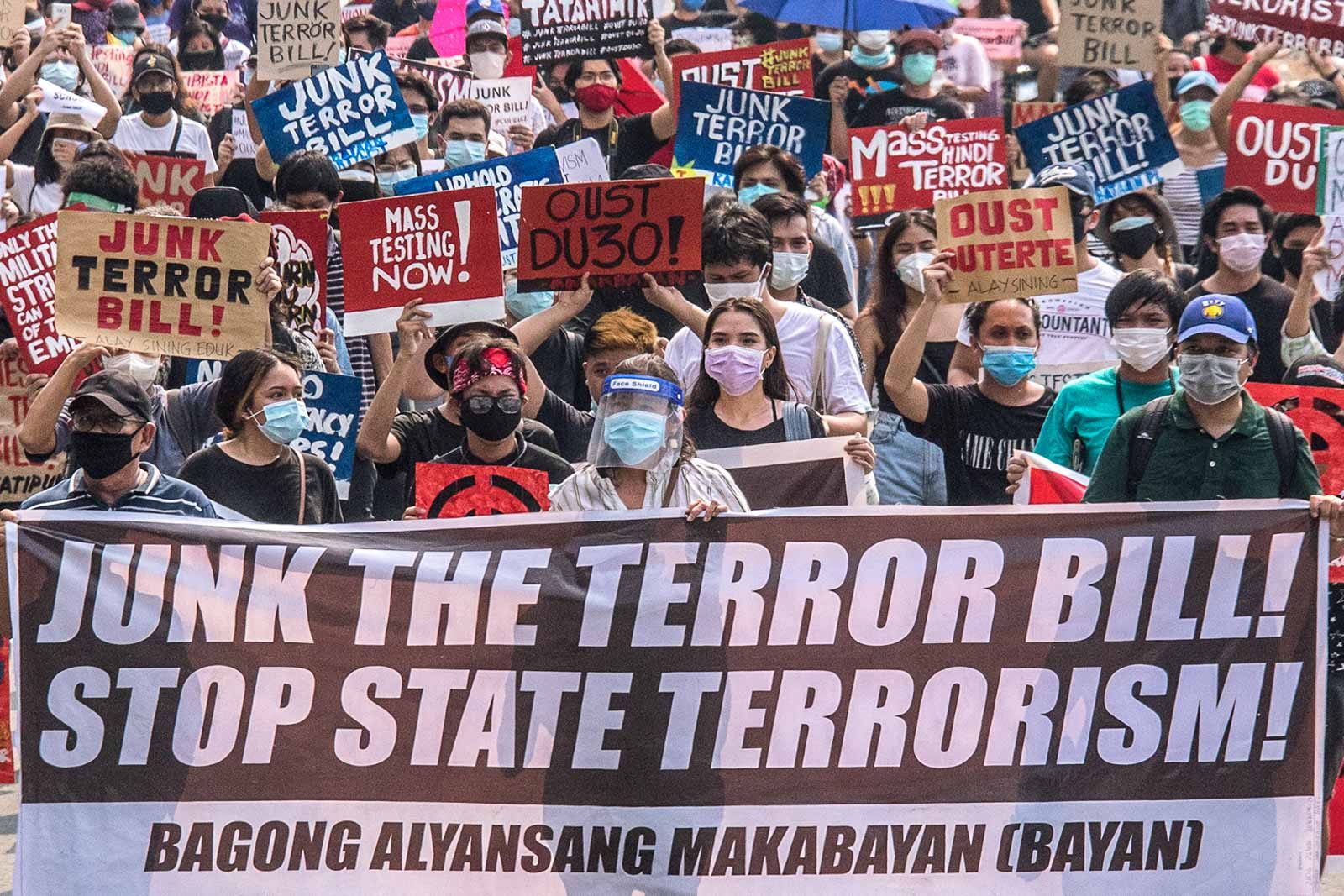

MANILA, Philippines – The 2007 Human Security Act was contested legally as soon as it became a law under Gloria Macapagal Arroyo, but human rights lawyers failed to strike it down as unconstitutional because of technicalities, and now they are confronted with a new law they say is even more dangerous.
Retired Supreme Court associate justice Antonio Carpio said the new anti-terror bill penalizes freedom of speech.
Because of this, even though he concurred in the 2013 decision of the Supreme Court to junk the petition against the old law for lack of legal standing, Carpio said the new bill can be challenged on its face or right away without having to wait for an actual injury.
“Facial challenge was not allowed (then) because there was no provision penalizing freedom of speech in the 2007 Human Security Law. In the 2020 Anti-Terror Law, inciting to terrorism is penalized. So freedom of speech is involved, and thus facial challenge should be allowed,” Carpio told Rappler.
We are putting here a point by point comparison of the old law against the new anti-terror bill and its dangers.
These comparisons were culled from the matrix of Commission on Human Rights (CHR) lawyer Ross Tugade, and expert comments from the National Union of Peoples’ Lawyers (NUPL), Concerned Lawyers for Civil Liberties (CLCL), Ateneo Human Rights Center (AHRC), Free Legal Assistance Group (FLAG) chairman Chel Diokno, former Supreme Court spokesperson Ted Te, and Justice Carpio.
1. Definition of terror
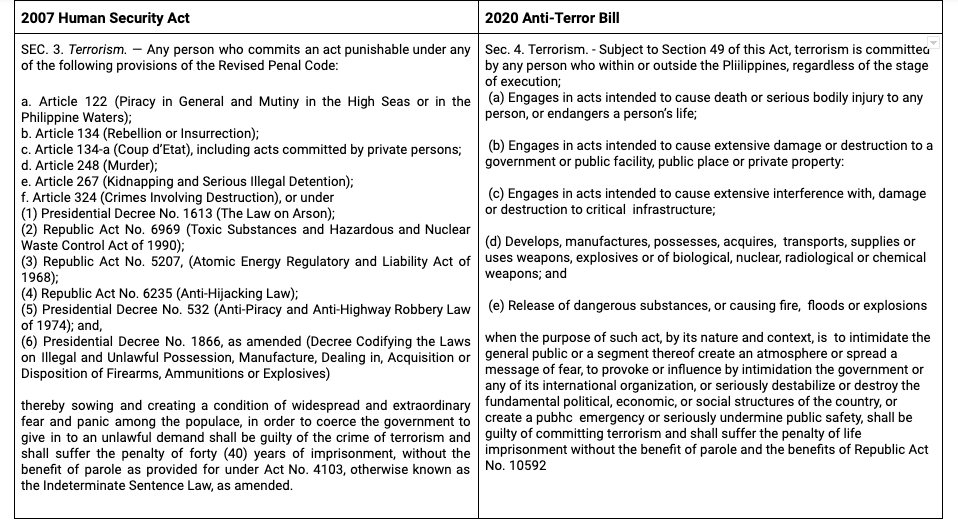
REMARKS: The old law and the new bill punish already existing crimes.
In the 2007 Human Security Act, if the crimes are committed to sow fear and panic, they would be punished by up to 40 years in prison without the benefit of parole.
The 2020 anti-terror bill adds qualifications for crimes to be punishable by life imprisonment without the benefits of both parole and good conduct time allowance (GCTA): if the crimes are done to intimidate the general public or if they seriously destabilize or destroy the fundamental political, economic, or social structures of the country.
“The 2020 anti-terror bill could punish or at least discourage legal activity and exercise of freedom of speech and association in any form or platform, inside or outside the country, because of the broad and vague definition of what terrorism is,” said NUPL president Edre Olalia.
The Duterte administration has defended the bill by saying it has a safeguard under Section 4, which reads:
“Provided, That, terrorism as defined in this Section shall not include advocacy, protest, dissent, stoppage of work, industrial or mass action, and other similar exercises of civil and political rights, which are not intended to cause death or serious physical harm to a person, to endanger a person’s life, or to create a serious risk to public safety.”(emphasis ours)
However, there is a caveat at the end of that clause that says dissent is not exempted if it creates a serious risk to public safety. In this context, Filipinos should note that rants on Twitter and Facebook by teachers during the pandemic have been used as grounds by government to charge them with inciting to sedition.
“The danger therein lies with how the government can construe legitimate acts of dissent or opposition within these definitions – it gives the government almost free rein in determining who are suspected terrorists. Even ordinary citizens airing their grievances against government on social media may fall within its ambit,” said the CLCL.
2. Inciting, planning, training, preparing, and facilitating terrorism
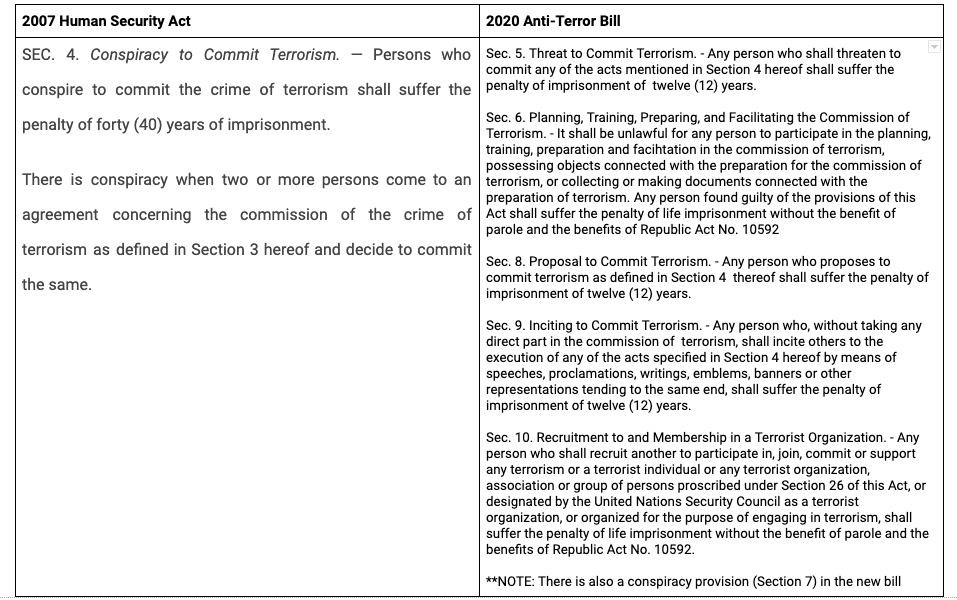
REMARKS: The new bill added as crimes threat, planning, training, facilitating, proposal and inciting to terrorism, as well as recruitment and membership to a terrorist organization, on top of conspiracy to commit terrorism.
“It’s very easy for the administration to go after those they see as critics. I myself was charged with inciting to sedition, which was later found to have no basis at all. From experience, I can say it’s possible that critics will be charged with inciting to terrorism even without basis,” said Diokno.
Carpio said that because inciting to terrorism is penalized, including speeches, proclamations, writings, emblems and banners, freedom of speech is now directly involved, which means it now touches on fundamental constitutional rights.
Te agreed that Section 9 and portions of Section 10 are related to content, which will allow a facial challenge to the law, meaning, it can be questioned without having to wait for an actual injury to happen to the petitioner.
“As a general rule, a facial challenge would apply to free speech cases,” said Te.
3. Arrest and detention without judicial warrants
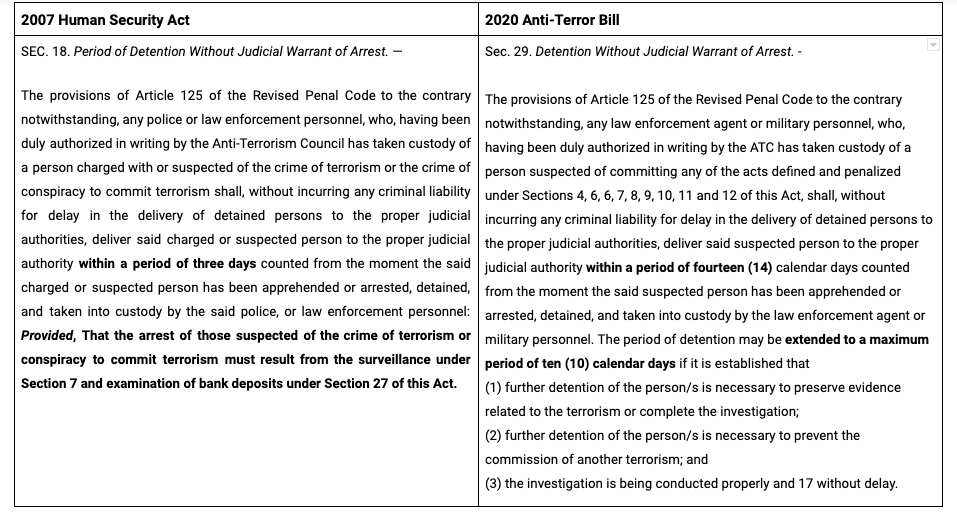
REMARKS: The old law and the new bill allow the arrest and detention of suspected terrorists through the Anti-Terror Council (ATC). In the new bill the Anti-Terror Council (ATC) will be made up of top Cabinet officials. This means they would no longer have to obtain warrants from the court to do this.
Groups had already tried to challenge Section 18 of the old law before for violating due process and universal human and civil rights.
But there are two big differences between the old law and new bill.
- Surveillance as a requisite
First, the old law only allows an ATC-authorized arrest and detention if it results “from the surveillance under Section 7 and examination of bank deposits under Section 27 of this Act.”
In contrast, according to Carpio, “The new Anti-Terror Law does not provide for this limitation. This limitation under the 2007 Human Security Act is akin to the crime being committed in the presence of the police officer, for which warrantless arrests are allowed.”
It means that in the old law, the warrantless arrest borne out of surveillance can fall under one of the 3 elements of a valid warrantless arrest, which is, being caught in the act. If a person has been surveilled, an agent can say he caught that person in the act.
The new law does not have that limitation, casting a wider net on who may be arrested without court warrants.
- Prolonged detention
Second, the old law says that law enforcers must bring a suspect to court within 3 days. The new bill specifies a maximum of 14 days with an extension of another 10 days to keep a suspect in custody, for a total of 24 days.
“It allows such prolonged detention beyond what the Constitution says is the maximum period (3 days) and only for very specific crimes like rebellion or invasion,” said Olalia.
Olalia is referring to Section 18, Article VII of the Constitution which provides for the suspension of the privilege of the writ of habeas corpus when martial law is declared.
“During the suspension of the privilege of the writ, any person thus arrested or detained shall be judicially charged within three days, otherwise he shall be released,” the Constitution says.
4. Preliminary proscription as terrorists
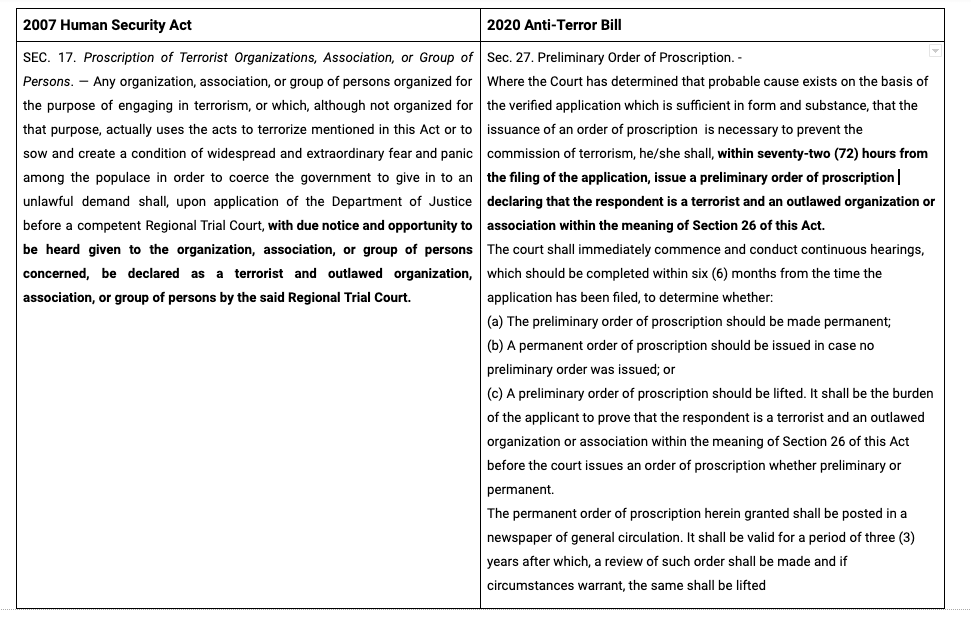
REMARKS: In the old law, the court should conduct a full trial before it can declare anyone a terrorist.
The new bill “allows the courts to declare preliminarily groups as terrorists even without a full hearing,” said Olalia.
The preliminary declaration can come as quickly as in 72 hours.
Using the 2007 Human Security Act, the Department of Justice (DOJ) in 2018 tried to declare as terrorists 649 people, including Communist Party of the Philippines (CPP) founding chairman Jose Maria Sison. The DOJ also included United Nations Special Rapporteur Victoria Tauli-Corpuz and former Bayan Muna representative Satur Ocampo, and hundreds of John Does.
Until now, the court has not come out with a decision and the DOJ has actually trimmed its list to only 8. The people in the petition are still untouched as far as proscription goes.
In the new proposed law, the court, if it finds probable cause and finds the petition sufficient in form and substance, can issue within 72 hours a preliminary order of proscription, meaning people can be declared as terrorists right away.
“(It) means that a person can be labeled a terrorist upon designation of the government, without requiring said person the opportunity to oppose or present contrary evidence. Thus, a person may be arrested for merely being a member of an organization that is unilaterally and administratively declared as terrorist,” said the AHRC.
5. Prolonged and broadened surveillance
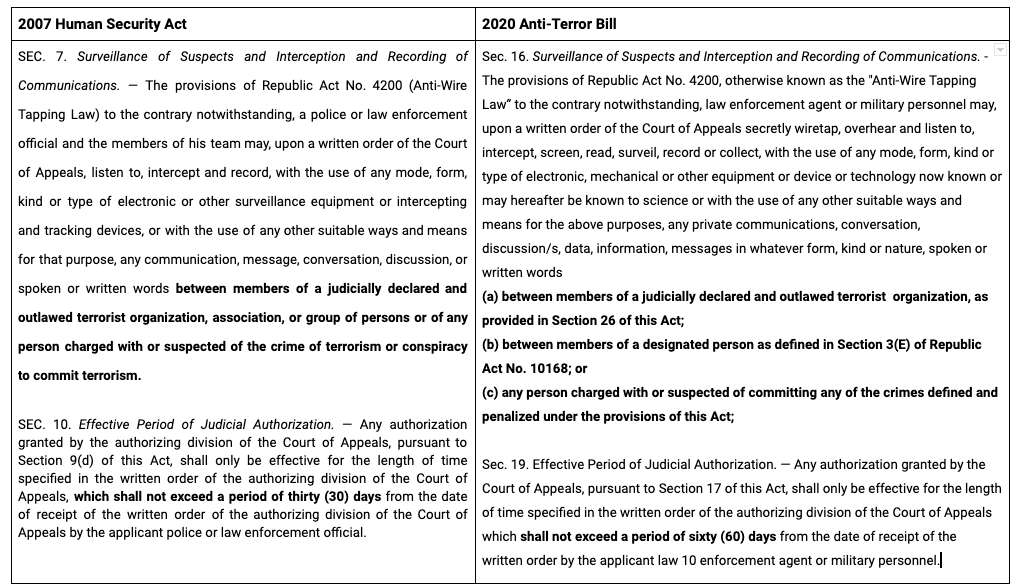
REMARKS: While both allow surveillance on not only judicially declared terrorists, but also suspected terrorists, because the new bill adds a lot of new crimes, there are more people who can be subjected to surveillance. These include those suspected of threatening, planning, training, facilitating, proposing and inciting to terrorism – unlike the old law where only the suspected terrorist and conspirator can be subjected to surveillance.
The old law also provides for a 30-day limit from the court order to conduct the surveillance, while the new one would allow a maximum of 60 days.
“The general tone of the bill supports secret surveillance – the courts are required to be informed of such surveillance, but only upon filing of charges before the prosecutor. In short, subjects of surveillance and suspected persons will have already been hauled to jail before they are made aware of actions against them,” said the CLCL.
6. Restriction on travel
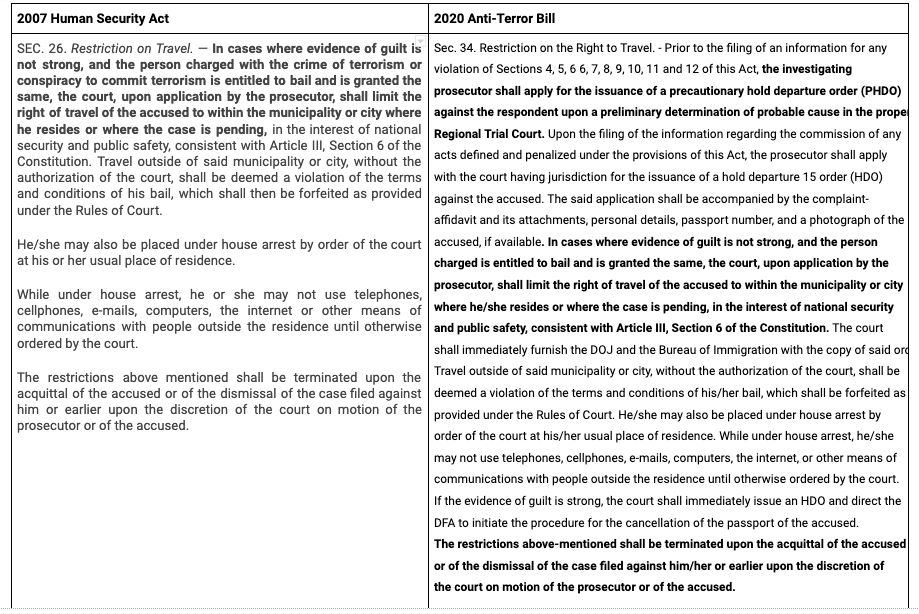
REMARKS: In the old law, the government can restrict a suspect’s movement to only within the municipality or city of his or her residence, if the court has determined that the guilt is not strong and the suspect is entitled to bail. This means the restriction can only be applied when the suspect has been charged in court.
In the new bill, the government can restrict travel even when the suspect has not yet been charged. This is through the application of a Precautionary Hold Departure Order (PHDO) which can bar a suspect from leaving the country.
A PHDO is a new rule by the Supreme Court that allows a Hold Departure Order (HDO) even if the complaint has not reached the court yet. HDOs are generally issued by courts only, but there were situations when, by the time the case reached the court, the suspect had already fled.
The new bill provides that upon acquittal, the restrictions shall be lifted. In the old law, an acquitted person is entitled to damages, but not so in the new bill.
7. No more costly damages to acquitted people
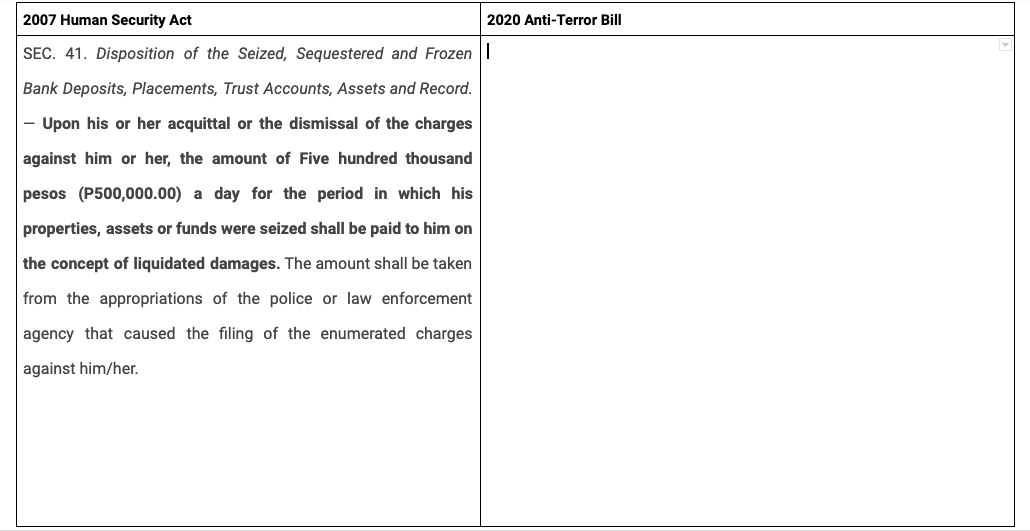
REMARKS: The new bill no longer has a clause that would require government to pay costly damages to a suspect if he or she is acquitted.
Under the old law, Section 41 provided that a person who is tried for terrorism, but is acquitted, gets to be paid P500,000 for every day that his or her assets were seized. This would be charged to the law enforcer.
In an earlier message, Justice Secretary Menardo Guevarra said Section 41 was the reason why complaints and prosecution under the 2007 human security act were “minimal.”
The 2020 anti-terror bill deletes that provision.
“It does not penalize malicious obtaining of authority from the courts for surveillance, or refusal to restore or delay in restoring seized, sequestered and frozen bank deposits, accounts, assets and records, nor does it grant payment to those falsely and wrongly accused of terrorism which was penalized with a fine of Php 500,000 for every day of detention under the old anti-terror law,” said the CLCL.
Several groups have been intensifying their campaign against the bill, both in the streets and on social media, even as Congress has already passed it. The measure can immediately be sent to President Rodrigo Duterte for signature. The President already certified the bill as urgent.
– Rappler.com
Add a comment
How does this make you feel?
There are no comments yet. Add your comment to start the conversation.